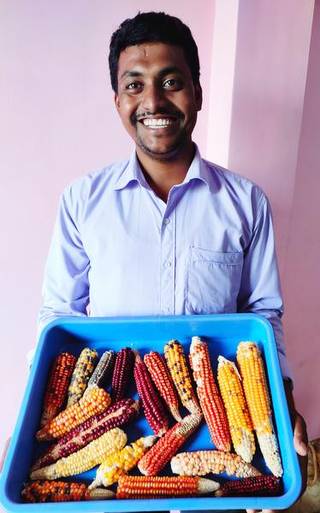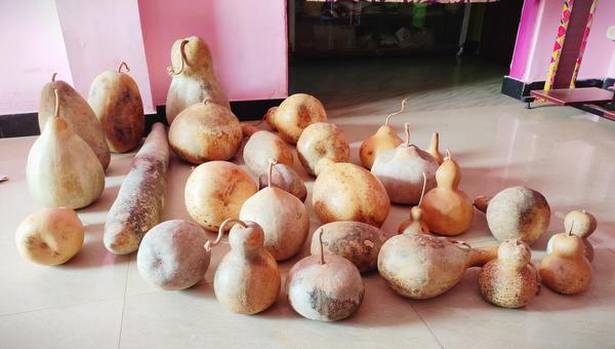Monthly Archives: July 2019
15
14
13
12
Indian team in Hyperloop Pod contest presents prototype
These students devote three-four hours every day after college and now their work has come to fruition as they have raised `1 crore from sponsors and finally built a pod and a 40-metre test track.
Bengaluru :
At an event hosted by Atria Institute of Technology on Tuesday, aerospace engineering student from IIT Madras, Sai Madhav, presented his team’s prototype pod for the SpaceX Hyperloop Pod competition to his audience.
Avikshar Hyperloop is one of the 22 teams out of the 1,600 teams worldwide and also the only team from Asia that has qualified to the finals. It is a group of about 30 students from inter-disciplinary backgrounds who have been working on creating their own pod since September 2017. These students devote three-four hours every day after college and now their work has come to fruition as they have raised `1 crore from sponsors and finally built a pod and a 40-metre test track.
SAE India, a member-driven organisation which acts as a knowledge partner for students and faculty in automotive and aerospace engineering, hosted its second event in its lecture series that deals with aerospace engineering. It also functions as a think-tank and a policy maker. The second lecture was specifically about the Hyperloop, an almost too-good-to-be-true transportation service proposed by Elon Musk, CEO of SpaceX and Tesla. The Hyperloop, if installed, seeks to reduce travel time drastically. It is supposed to be a land-based transportation service where pods, that house passengers, can levitate and zoom through tunnels by having the air pumped out of them in order to create a near-perfect vacuum for greater speed. It boasts of a travel time of just 30 minutes from Bengaluru to Chennai.
Being the main speaker at the event, Madhav’s presentation and video of the only Indian team to qualify for this competition impressed a mixture of faculty, students and heads of the SAE group. He also talked about how the plan for building their pod looked solid on paper but when it came to the actuality of making it, they faced a lot of discrepancies. Being in the stability team, he deals with a lot of mechanical aspects of the pod. During the question-and-answer session, the question of the safety of the passengers was raised as the Hyperloop project has bragged about reaching speeds up to 500-600 km/hour. “Yes, passengers will feel major deceleration effects. All this is new and I can only hope that newer research yields positive results,” he said. J Munirathnam, who is on the Board of SAE India for aerospace, also said the project will have to be built after taking into consideration the degree of g-force that the human body can withstand.
“This is completely new. We have the freedom to explore it. If you look at building a car, parameters have already been established for it. That is not the case here,” Madhav said.
The hype about hyperloop
The Hyperloop, if installed, seeks to reduce travel time drastically. It is supposed to be a land-based transportation service where pods, that house passengers, can levitate and zoom through tunnels by having the air pumped out of them in order to create a near-perfect vacuum for greater speed.
source: http://www.newindianexpress.com / The New Indian Express / Home> Cities> Bengaluru / by Chinmay Manoj / Express News Service / July 11th, 2019
Meet Parameswaran, aeronautical engineer-turned organic farmer

Oddanchatram-based organic farmer A Parameswaran has created a bank of over 300 varieties of seeds of native vegetables and fruits
Patches of dark rain-bearing clouds gather in the far west, masking the lofty peaks of the majestic Anamalai mountains that separate Kerala and Tamil Nadu. The South West monsoon has set in, but the interior Dindigul district of southern Tamil Nadu falls in the rain shadow region, getting only an occasional drizzle and a breeze or two. At the Kuttiyagoundanpudur village near Oddanchatram in Dindigul district, the red ochre soil in A Parameswaran’s six-acre farm is athirst for some moisture. The brinjal saplings are wilting in the harsh sun; baby vegetables take shelter under the skimpy shade of the leaves.
“But my plants will not die as they are native to this region. The drizzle is enough for them to sustain till October when the North East monsoon will bring us rains,” says Parameswaran, an aeronautical engineer-turned organic farmer.
The 28-year-old has been collecting seeds of native vegetables and fruits for the past three years. He now has a collection of over 300 varieties of seeds of different vegetables and has set up the Aadhiyagai native seed bank, from which he provides seeds to farmers in the neighbourhood.
“I grew up watching my parents till dry land and though I graduated in Engineering, my love for agriculture remained intact. That’s why I returned to my village,” says Parameswaran. The pocket around Oddanchatram, despite being arid and devoid of any perennial water source, has emerged as the vegetable hub of the State. The market in Oddanchatram is the largest in Southern India, in terms of the volume of vegetables it sends on a daily basis to a majority of Kerala and some parts of Karnataka. “But that’s all because of production-focused agriculture. Genetically-modified seeds, flush with pesticides and fertilisers are giving the results,” says Parameswaran.
“Until some two decades ago, we never had to buy seeds. We would let some of the yield dry up on the plant itself. And seeds from those vegetables/fruits were used for sowing in the next season. Today, a farmer spends 20 per cent of his investment on seeds. At the Government seed bank, 100 grams of seeds are sold for ₹3,500 and about 150 to 200 grams of seeds are needed for an acre of land.”
Parameshwaran realised the importance of saving native seeds after attending a workshop at Vanagam in Karur, where he was inspired by the ideals of organic farmer pioneer G Nammalvar. “That was also the time when things like Bt brinjal were hot topics.” He went around villages across Tamil Nadu over he past couple of years, speaking to older people, learning about the various vegetables native to specific regions. “I was surprised that I ended up noting down names of about 100 varieties of brinjal alone. A lot of them were already lost and were nowhere to be found. Likewise, there are as many varieties of lady’s finger. Ever seen a pink ladies finger? You can find it in the Kongu belt,” he adds.
“Gradually, I found out some native varieties that people continued to sow in small patches of land either in their backyards or in farms. These were used for family consumption and was not sold in the market. That’s where I collected the seeds from. Now, I encourage every farmer in my village to set aside a small patch to grow native vegetables.”
Parameswaran also sets up terrace gardens and backyard farms for people. “Last month, I set up a native vegetable farm in one cent of land for a friend in Madurai. Even in congested cities, people can grow these native varieties. They don’t need much of any resource. Native seeds are naturally potent, drought-resistant and have high immune levels against pests and diseases.”
“The only reason why native vegetable varieties are not commercially viable in today’s production-result-oriented agriculture is that they are long-standing crops. Winged beans and sword beans are not as popular for the same reason. Some native plants may live for a year and yield only after four months from sowing. There’s one variety of lady’s finger that lives for four years. Whereas, genetically modified brinjal’s life span is only four months and it yields within 20 days and the farmer can keep going in for the next batch of plants in quick succession,” he adds.
Parmeswaran is now in the process of collecting seeds of native vegetables from Karnataka, Kerala and Andhra Pradesh.
For details, visit aadhiayagai.com, facebook.com/aadhiyagaiseedsavers or call 085263 66796
source: http://www.thehindu.com / The Hindu / Home> Life & Style> Homes and Gardens / by A. Shrikumar / July 06th, 2019

